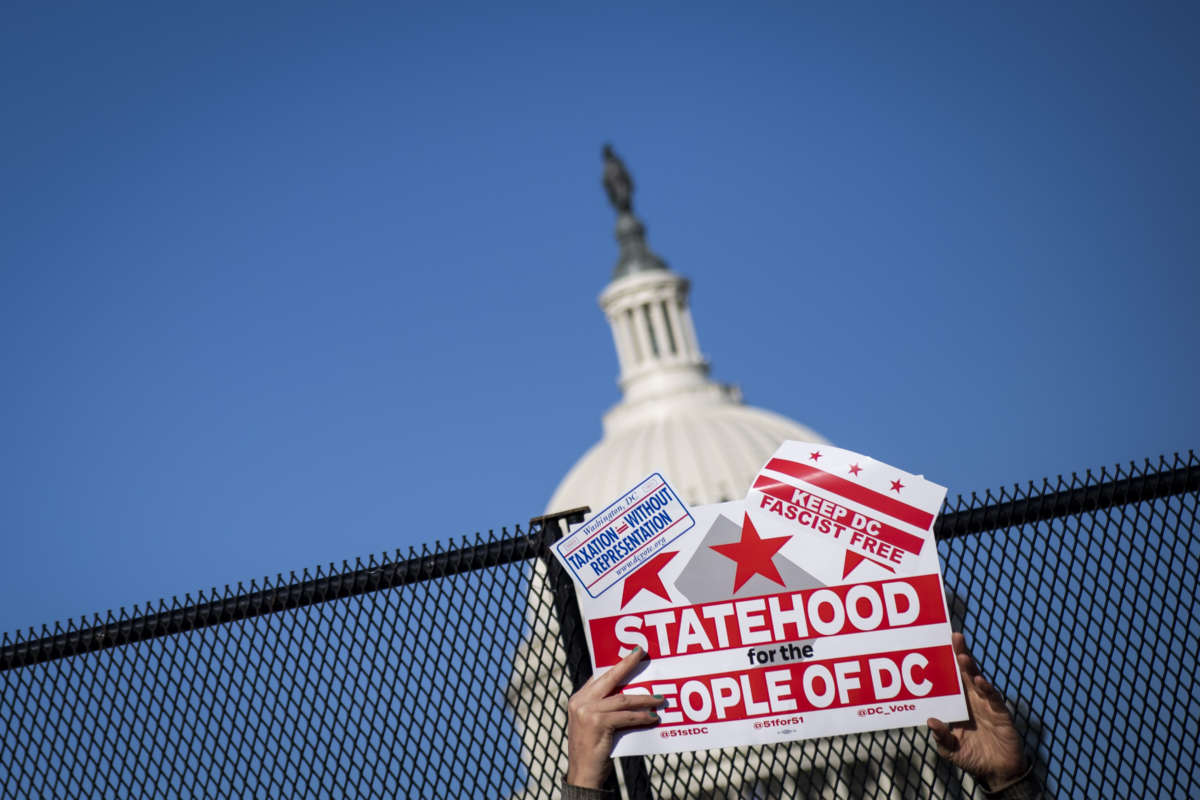The House Oversight Committee plans to meet on Monday to discuss legislation that, if passed, would grant statehood to Washington, D.C., providing residents of the nation’s capital with the right to fair representation in Congress.
The measure, H.R. 51, was introduced by D.C. Del. Eleanor Holmes Norton earlier this year. The bill has more than 200 co-sponsors in the House.
Along with representation in the national legislature, the bill would also reduce the size of the district by keeping important federal buildings and landmarks under federal jurisdiction, like the Capitol building and the White House, among others. It would also officially recognize the words of the acronym D.C. stands for, replacing the “District of Columbia” with “Douglass Commonwealth,” in recognition of abolitionist and 19th-century Black rights activist Frederick Douglass.
Norton, who authored the bill and has been pushing for D.C. statehood for decades, has said one of the reasons it’s important for the bill to become law is to ensure residents of the area are not taxed without representation within Congress.
“All we’re looking for is equality with other Americans, especially since we pay the highest federal taxes per capita in the United States,” she said, per reporting from NPR.
Polling shows that a majority of Americans support granting statehood to the nation’s capital. A recent Data for Progress poll, conducted in mid-February, showed that 54 percent of respondents were in support, with just 35 percent opposed.
A Fortune/SurveyMonkey poll conducted in January found tighter results. Regardless, a plurality (49 percent) in that poll supported statehood for Washington, D.C., with 45 percent opposed to the idea.
The proposal is almost guaranteed passage within the House of Representatives, where a similar bill passed last year. However, the bill stalled in the Republican-led Senate, and it’s likely that the GOP would use the Senate filibuster to block its passage this year, even though Democrats technically control that chamber, with Vice President Kamala Harris providing the tie-breaking vote. President Joe Biden has expressed support for D.C. statehood.
Some Republicans are accusing Democrats of pushing for statehood as a means to get more Democratic senators and representatives within Congress. Others have attempted to delegitimize the movement by deriding D.C. workers.
“What vital industries would the new state of Washington represent? Lobbying? Bureaucracy? Give me a break,” Sen. Tom Cotton (R-Arkansas) bemoaned last summer. “By far, the largest group of workers in the city are bureaucrats and other white-collar professionals.”
Cotton further used that complaint to justify why a state like Wyoming, which has fewer residents than Washington, D.C., should be allowed statehood but the district should not.
But others have noted that granting statehood to Washington, D.C., is also an issue of racial equality, as the majority of the more than 700,000 residents in D.C. are Black. Indeed, some have noted that the refusal to grant its residents representation in Congress is entrenched in decades of animosity toward Black Americans.
“This staggering lack of democracy in the nation’s capital would not persist but for the widespread desire to limit Black political power,” historian Kyla Sommers wrote in an op-ed for The Washington Post on Monday. “History exposes the racism that keeps Congress firmly in control of D.C.”
Refusing to recognize Washington, D.C., residents’ rights “is rooted in this same fear of Black power and racist belief that a majority-non-White populace is incapable of independently governing itself,” Sommers added.
Our most important fundraising appeal of the year
December is the most critical time of year for Truthout, because our nonprofit news is funded almost entirely by individual donations from readers like you. So before you navigate away, we ask that you take just a second to support Truthout with a tax-deductible donation.
This year is a little different. We are up against a far-reaching, wide-scale attack on press freedom coming from the Trump administration. 2025 was a year of frightening censorship, news industry corporate consolidation, and worsening financial conditions for progressive nonprofits across the board.
We can only resist Trump’s agenda by cultivating a strong base of support. The right-wing mediasphere is funded comfortably by billionaire owners and venture capitalist philanthropists. At Truthout, we have you.
We’ve set an ambitious target for our year-end campaign — a goal of $119,000 to keep up our fight against authoritarianism in 2026. Please take a meaningful action in this fight: make a one-time or monthly donation to Truthout before December 31. If you have the means, please dig deep.
